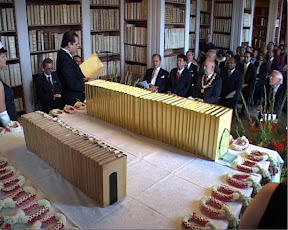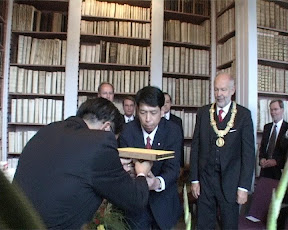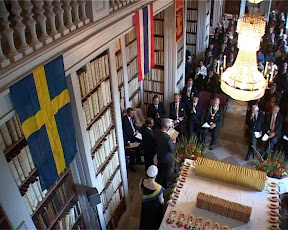A Welcome Speech 
Dr. Ulf Göranson
Professor of Law & Chief Librarian, Uppsala University
On the occasion of
The Presentation of the Royal Donation
The Buddhist Era 2500 Great International Council Pāḷi Tipiṭaka
40 Volumes in Roman Script
for
The Carolina Rediviva, Uppsala University, Sweden
September 13, B.E. 2548 (2005)
A warm welcome to Uppsala University and its Library. We have all come together today to take part in a Royal Donation to Sweden and to this its oldest seat of learning with a library worthy of its mother institution. The gift we are about to receive - the Pāḷi Tipiṭaka in Roman script - is one of the most exquisite ever bequeathed upon us.
Already more than 100 years ago, in 1895, Uppsala University Library received a copy of King Chulalongkorn Chulachomklao's first printed edition of this sacred text, then in Siamese script. It was a great effort, in its time, to transform the text from its numerous manuscript sources in various Asian scripts, the Pāḷi language never having received a script of its own. However, Uppsala was not the only recipient of these fine volumes. No less than 260 learned institutions all over the world received one. And to Thai monasteries 500 sets were given. It is a sad fact that books do not live well in the tropical climate. I learnt yesterday at a most informative presentation in Stockholm that today only one single full set of the 1893 edition has survived in Thailand.
Was the old Royal donation a very prestigious gift to honour and preserve, the edition which soon will be presented to us is of an extraordinary quality. It is one of only three existing sets, the other two being already transferred to Thailand and Sri Lanka, where they are kept in the Constitutional Court and the Presidential Palace, respectively. For the Library it is truly difficult to find the right words of gratitude and appreciation of having received the honour to be the third place where the 40 volumes will be kept. We shall soon see them carried in.
The two Royal gift editions of Pāḷi Tipiṭaka will be kept in this shrine of the Library, the Book Hall. It is fitting and becoming, since they follow a tradition since the founding in 1620 of the Library. This room represents the many donors - kings, queens, magnates in heritage and fortune, and more ordinary patrons of learning and research - whose benevolence and generosity have been essential for the building of a great library collection.
Six centuries of printing form the necessary basis of mankind's knowledge, culture, humanity, and religious believes. Around the walls of this room we can find both landmarks in all these directions and works now since long forgotten but evidently of importance at the time of their printing. Today, the electronic medium has arrived as a powerful complement to the printed text. The Pāḷi Tipiṭaka Project has, besides printing beautiful books, also taken full advantage of the unprecedented efficiency and dissemination capacity of the new technique.
The Pāḷi Tipiṭaka and the religion of which it constitutes the sacred text and learning has its roots more than 2500 years ago. It is both scaring and fascinating to compare the standards of southern Asia in those days with what took place in this part of the world. It is in no ways to our favour. We had then just started to understand the use of iron for better tools and weapons. But it was very long before any written sources appeared to give later generations a picture of what went on in the minds and believes of the population here. We can, however, be quite sure that intellectual enhancement, refinement and humanity were no concepts of high esteem for our forefathers in times of the Buddha...


